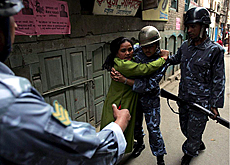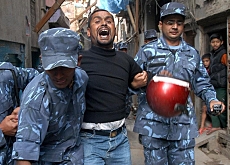Nepal election tensions affect Swiss aid

As controversial elections took place in Nepal, the head of the Swiss aid agency office in Kathmandu told swissinfo the country has ground to a virtual standstill.
Jörg Frieden, from the Swiss Agency for Development and Cooperation (SDC), said there was a climate of fear around the general strike and the municipal elections.
Troops in Nepal were given orders to shoot anyone who tried to disrupt Wednesday’s municipal elections, while Maoist rebels have been involved in sporadic attacks to uphold the general strike they called this week.
The vote, ordered by King Gyanendra, who fired the government and seized absolute power last year, was boycotted by the rebels and by the country’s main political groups.
The main political parties are demanding that the king hand power back to an all-party government. Political leaders say they fear the king will use the municipal polls to tighten his grip on power.
Frieden, who oversees an annual development budget of SFr20 million ($15.4 million) in Nepal, told swissinfo that the security situation had caused an unavoidable slowdown in activities.
swissinfo: What was the pre-election atmosphere like in Nepal?
Jörg Frieden: We are at the end of the third day of a general strike across the country and the people have followed the strike, partly because it has been punctuated by Maoist attacks of different kinds.
There is a climate of fear, although people are still walking the streets. With the exception of vehicles requisitioned by the authorities and forced to provide transport services, almost no private cars have been on the streets of Kathmandu for the last three days.
There is almost no travel between cities and regions, no long distance travel at all, with the exception of some convoys escorted by the military.
Wednesday is the day of the elections and people are very much concerned about it. It is a national holiday but the country has been on hold for three days and will probably continue to be so for a few more days.
swissinfo: How does this affect the work of SDC?
J.F.: We’ve been affected like everybody else by the general strike over the last days. We haven’t been able to travel from Kathmandu to any of our project destinations. And our colleagues, who work in the districts, couldn’t really leave the district headquarters so we have all been working from offices.
For the time being the major concern is for the security situation. Since the end of the unilateral Maoist ceasefire on January 3, there has been a progressive deterioration of the security situation, although development work and foreigners have not been targeted at all.
But of course out of 550 people working for us, directly and indirectly, only very few are foreigners. So the fact that foreigners are not being targeted is not enough for us to be reassured.
We have to focus very much on security measures so this means an unavoidable slowdown of our activities. Of course we are concerned about the coming months because we don’t know how the situation will evolve for us in terms of development work.
Population of Nepal: 26.3 million.
Head of State: King Gyanendra Bir Bikram Shah Dev.
Maoist rebels have been waging a campaign against the constitutional monarchy since 1996 in a conflict that has left more than 12,000 people dead.
King Gyanendra declared a state of emergency in February 2005.
Nepal is one of the SDC’s priority countries. The SDC in Nepal works mainly in rural areas, which are at least partially controlled by the Maoist insurgency.
The agency is active in rural infrastructure development, building suspension bridges and roads.
Its agricultural projects support forestry and soil management and the SDC also provides skill development and vocational training.
The SDC is also involved in activities linked to the conflict such as human rights initiatives, both nationally and at local level.

In compliance with the JTI standards
More: SWI swissinfo.ch certified by the Journalism Trust Initiative












You can find an overview of ongoing debates with our journalists here . Please join us!
If you want to start a conversation about a topic raised in this article or want to report factual errors, email us at english@swissinfo.ch.